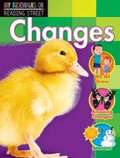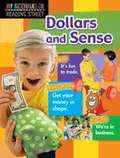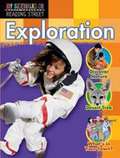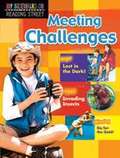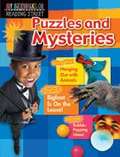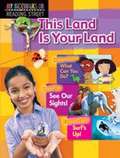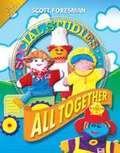- Table View
- List View
Scott Foresman Sidewalks, Adventurers [Grade 5, Level E5]
by Sharon Vaughn Connie Juel Deborah Simmons Jeanne R. ParatoreNIMAC-sourced textbook
Scott Foresman Sidewalks, Adventures by Land, Air, and Water [Grade 4, Level D5]
by Sharon Vaughn Connie Juel Deborah Simmons Jeanne R. ParatoreNIMAC-sourced textbook
Scott Foresman Sidewalks, Changes [Grade 1, Level A3]
by Sharon Vaughn Connie Juel Deborah Simmons Jeanne R. ParatoreNIMAC-sourced textbook
Scott Foresman Sidewalks, Communities [Grade 1, Level A2]
by Sharon Vaughn Connie Juel Deborah Simmons Jeanne R. ParatoreNIMAC-sourced textbook
Scott Foresman Sidewalks, Creative Ideas [Grade 2, Level B3]
by Sharon Vaughn Connie Juel Deborah Simmons Jeanne R. ParatoreNIMAC-sourced textbook
Scott Foresman Sidewalks, Cultures [Grade 3, Level C5]
by Sharon Vaughn Connie Juel Deborah Simmons Jeanne R. ParatoreNIMAC-sourced textbook
Scott Foresman Sidewalks, Doing the Right Thing [Grade 5, Level E2]
by Sharon Vaughn Connie Juel Deborah Simmons Jeanne R. ParatoreNIMAC-sourced textbook
Scott Foresman Sidewalks, Dollars and Sense [Grade 3, Level C1]
by Sharon Vaughn Connie Juel Deborah Simmons Jeanne R. ParatoreNIMAC-sourced textbook
Scott Foresman Sidewalks, Exploration Grade 2 Level B1
by Sharon Vaughn Connie Juel Deborah Simmons Jeanne R. ParatoreNIMAC-sourced textbook
Scott Foresman Sidewalks, Inventors and Artists [Grade 5, Level E3]
by Sharon Vaughn Connie Juel Deborah Simmons Jeanne R. ParatoreNIMAC-sourced textbook
Scott Foresman Sidewalks, Meeting Challenges [Grade 5, Level E1]
by Sharon Vaughn Connie Juel Deborah Simmons Jeanne R. ParatoreNIMAC-sourced textbook
Scott Foresman Sidewalks, Patterns in Nature [Grade 4, Level D3]
by Sharon Vaughn Connie Juel Deborah Simmons Jeanne R. ParatoreNIMAC-sourced textbook
Scott Foresman Sidewalks, People and Nature [Grade 3, Level C3]
by Sharon Vaughn Connie Juel Deborah Simmons Jeanne R. ParatoreNIMAC-sourced textbook
Scott Foresman Sidewalks, Puzzles and Mysteries [Grade 4, Level D4]
by Sharon Vaughn Connie Juel Deborah Simmons Jeanne R. ParatoreNIMAC-sourced textbook
Scott Foresman Sidewalks, Reaching for Goals [Grade 4, Level D6]
by Sharon Vaughn Connie Juel Deborah Simmons Jeanne R. ParatoreNIMAC-sourced textbook
Scott Foresman Sidewalks, Responsibility [Grade 2, Level B5]
by Sharon Vaughn Connie Juel Deborah Simmons Jeanne R. ParatoreNIMAC-sourced textbook
Scott Foresman Sidewalks, Smart Solutions [Grade 3, Level C2]
by Sharon Vaughn Connie Juel Deborah Simmons Jeanne R. ParatoreNIMAC-sourced textbook
Scott Foresman Sidewalks, The Unexpected [Grade 5, Level E6]
by Sharon Vaughn Connie Juel Deborah Simmons Jeanne R. ParatoreNIMAC-sourced textbook
Scott Foresman Sidewalks, This Land Is Your Land [Grade 4, Level D1]
by Sharon Vaughn Connie Juel Deborah Simmons Jeanne R. ParatoreNIMAC-sourced textbook
Scott Foresman Sidewalks, Treasures [Grade 1, Level A4]
by Sharon Vaughn Connie Juel Deborah Simmons Jeanne R. ParatoreNIMAC-sourced textbook
Scott Foresman Sidewalks, Work and Play [Grade 4, Level D2]
by Sharon Vaughn Connie Juel Deborah Simmons Jeanne R. ParatoreNIMAC-sourced textbook
Scott Foresman Social Studies Communities
by Candy Dawson Boyd Geneva Gay Rita GeigerNIMAC-sourced textbook
Scott Foresman Social Studies (Grade #1)
by Candy Dawson Boyd C. Frederick Risinger Geneva Gay Rita Geiger James B. Kracht Valerie Ooka Pang Sara Miranda SanchezThis book contains Time for School, In My Community, Work! Work! Work!, Our Earth, Our Resources, This is Our Country, Our Country, Our World, Social Studies Handbook, Biographies, Maps and Skills.
Scott Foresman Social Studies (New Jersey Edition)
by Scott ForesmanThere are six ways to show good citizenship: through respect, fairness, caring, responsibility,courage and honesty. In your textbook, you will learn about people who used these ways to help their community, state and country.
Scott Foresman Social Studies (New Jersey, Grade #4)
by Scott ForesmanThis book explores New Jersey on topics titled The Land of New Jersey, Native Americans and European Settlers, A New Nation, Building a Nation, New Century New Challenges Modern New Jersey Reference Guide, Biography, Maps, Reading Social Studies, Map and Globe Skills, Thinking Skills, Research and Writing Skills, Chart and Graph Skills, Charts, Graphs, Tables, etc.

